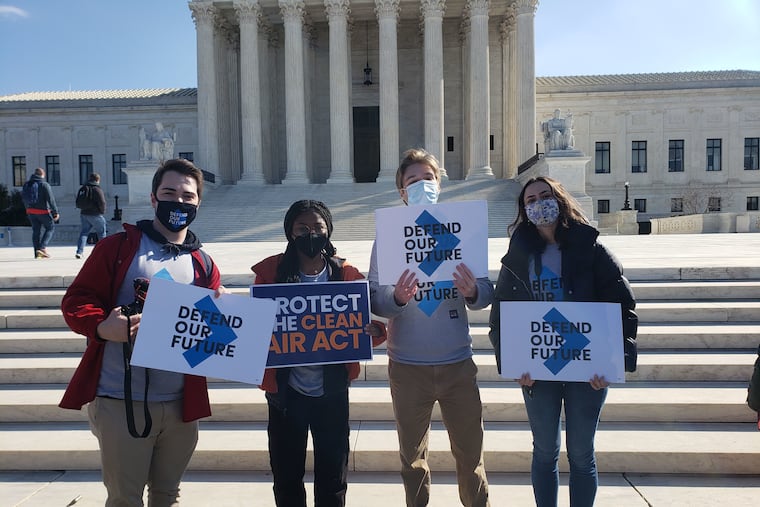The Supreme Court cannot allow coal companies to write their own rules | Opinion
In West Virginia v. EPA, the court is deciding "one of the most consequential cases for climate change and clean air in decades."

Last week I joined around 100 people on the steps of the U.S. Supreme Court to deliver a clear message: We can’t afford to lose years, or decades, in our fight against climate change. Inside, the court was hearing arguments in the case of West Virginia v. EPA, in which several coal companies and 19 states claim that the Environmental Protection Agency does not have the authority to make new rules limiting carbon emissions from power plants.
CNN reported that this case is “one of the most consequential cases for climate change and clean air in decades.” As a representative of Pennsylvania’s chapter of Defend Our Future, I traveled from Philadelphia to attend.
One of the key issues in the case is the scope of the Clean Air Act of 1970, a federal law that, among other things, grants the EPA the authority to protect public health and welfare from the harms caused by dangerous levels of pollution. The court has already ruled three times — in 2007, 2011, and 2014 — that the law empowers the EPA to regulate pollution.
During last week’s hearing, the justices heard arguments from both sides about how one portion of the law, Section 111, should be interpreted — and the degree to which the EPA has the authority to choose from a range of options to best regulate greenhouse gas emissions.
Coal-fired power plants are one of the biggest sources of climate pollution. Coal companies and their allies are seeking a court ruling that would sharply limit the EPA’s ability to address the climate crisis. Every American has the right to breathe clean air, including those who are not directly benefiting from the solipsistic dirtying of our atmosphere and land.
There is no time to delay. Climate change has already entered the room, it’s standing in the far corner. We need to bring climate to the center of everyone’s attention.
“Every American has the right to breathe clean air, including those who are not directly benefiting from the solipsistic dirtying of our atmosphere and land.”
Island nations are drowning under rapidly rising sea levels. Countries around the world are being battered by 150 mph winds causing tens of billions of dollars in damages because of the climate-related worsening of tropical storms and hurricanes. Here at home in Philadelphia, we’ve seen our city streets and highway systems flooded as a result of those worsening storms.
We cannot afford to let decades go by without seriously addressing the problem. Should the Supreme Court rule in favor of the coal companies, the industry will essentially be able to set its own emissions standards. We cannot allow coal companies to write their own rules in regard to harmful emissions. As the 17th fastest-warming city in the country, things won’t be getting any better for Philadelphians without serious changes.
I’m a member of the generation who will see some of the worst and most grievous consequences of climate change. I’ve unknowingly been contributing to this problem for 23 years and only recently took it upon myself to act.
I worry less about myself and my peers than I do the members of the next generation, those too young to have an impact, or those who have yet to be born. Personally, I want to spend my life photographing the beautiful wonders of our planet. I want to travel and learn of the diverse ecosystems and biological multifariousness. I want to show the world why our little blue marble is worth fighting for.
We as an entire global ecosystem need environmental regulations in order to remain alive and well. The Supreme Court should rule in favor of life, health, longevity, prosperity, and humanity. The court of the people needs to stand by the people.
When I think back on last week’s rally, I remember how a father and daughter shared the stage, playing John Denver’s “Take Me Home, Country Roads” as protesters arrived on the Supreme Court steps. A mother and her two young children stood among the crowd carrying signs that read: “Protect my lungs.”
The future generation is worth fighting for.
Conor Williams, a North Philadelphia resident, is an ambassador for Defend Our Future, a national environmental nonprofit funded by the Environmental Defense Fund.